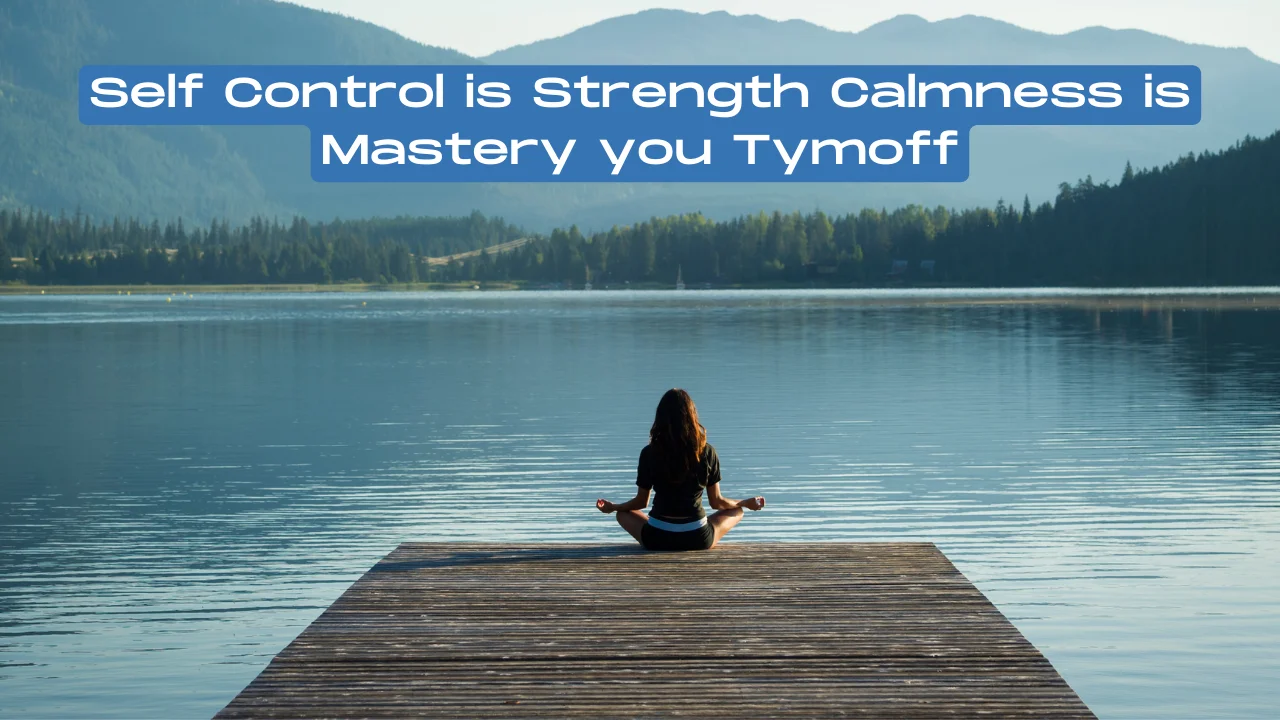That one sentence, “Self-control is strength,” encapsulates ageless wisdom. Quietness is power. Connecting self-regulation with personal empowerment, “you have to get to a point where your mood shifts based on the insignificant actions of someone else,” is profound. Personal development, emotional intelligence, and resilience all depend on knowing how to control one’s emotions and staying calm under pressure. “Self-control is strength; calmness is mastery, you Tymoff” is a reminder that mastering your inner world is the key to true strength. If you want to know how to become an expert at these things and put them to use every day, this article is for you.
People who want to be more self-reliant, emotionally stable, and successful in their personal and professional lives will find the shared insights particularly useful.
Understanding Self-Control as Strength

Defining Self-Control Clearly
Achieving long-term objectives requires self-control, which entails managing one’s impulses, emotions, and actions. True self-control, in contrast to suppression, involves coordinating one’s deliberate actions with one’s core beliefs and life goals. Taking this methodical approach helps one feel more respect for themselves and their values.
Benefits of Strong Self-Control
Academic success, better relationships, and overall mental and physical health are all positively correlated with self-control, according to psychological research. Individuals that exhibit strong self-control are able to rationally face challenges, stay focused on their objectives, and overcome obstacles with ease.
Techniques to Boost Self-Control
Practices like reflective journaling, goal setting, and mindfulness meditation greatly improve self-control. Mindfulness in particular heightens awareness, which in turn aids deliberate response rather than impulsive reaction to environmental cues.
Challenges and Solutions
Discipline can be tested when there are no immediate benefits. To combat this, it is helpful to establish attainable goals and to reward oneself when one reaches each milestone. This will reinforce good habits and encourage persistence.
Real-Life Examples of Self-Control
Think of the athletes who push through painful routines or the entrepreneurs who get past the first hurdles and go on to great success. They have shown that self-control is a key ingredient in the recipe for success by their unwavering commitment.
Calmness as Emotional Mastery
What is Calmness Exactly
Achieving inner peace in the face of external chaos is what it means to be calm. Rather than acting on impulse, one must learn to control their emotional responses. Being able to do this skill well exemplifies resilience and emotional intelligence.
Advantages of Mastering Calmness
The ability to solve problems, communicate clearly, and work efficiently are all improved when one can keep their cool under pressure. Being a calm person is a great way to bring stability and confidence to your team or community.
How to Cultivate Calmness
Calmness can be greatly enhanced through the practice of meditation, deep breathing exercises, and cognitive behavioral techniques. The ability to maintain a steady center in the face of adversity is a key component of these techniques.
Common Barriers to Calmness and Their Solutions
Distractions and stress can make it hard to relax. Methods like practicing mindfulness meditation, organizing one’s time wisely, and establishing clear boundaries help individuals deal with these disturbances and keep their inner peace.
Real-Life Applications of Calmness
Leaders and first responders who excel in high-pressure situations are able to maintain composure. In trying times, they remain calm and collected, which allows them to think clearly, make good decisions, and lead others effectively.
The Connection between Self-Control and Calmness
Interrelated Dynamics
A composed attitude supports self-control, and vice versa: self-control improves calmness. A vicious cycle of emotional steadiness and power is created when these traits reinforce one another.
Role of Emotional Intelligence
Being emotionally intelligent allows one to not only identify but also control and manage their emotions in a healthy way. Improving one’s emotional intelligence boosts one’s success in life and work.
Practical Approaches for Balance
Harmonious growth in self-restraint and serenity can be achieved through the integration of emotional intelligence training with mindfulness practices. Continual improvement and self-determination are achieved through consistent practice.
Comparison of Self-Control and Calmness
| Attributes | Self-Control | Calmness |
| Definition | Regulating impulses for long-term success | Maintaining inner peace in chaos |
| Primary Benefit | Better decision-making, goal achievement | Enhanced clarity and communication |
| Key Practices | Mindfulness, goal-setting | Meditation, deep breathing |
| Challenges | Delayed gratification | External stress and distractions |
| Real-Life Example | Athletes, disciplined entrepreneurs | Crisis managers, skilled leaders |
Personal Empowerment through Calmness Tymoff
Why Personal Empowerment Matters
When you learn to control your feelings and reactions, you take charge of your life. Gaining control over one’s life allows for more happiness, success, and resilience, which in turn shapes a more satisfying trajectory.
Empowering Techniques by Tymoff
In order to foster empowerment, Tymoff highlights motivational strategies such as emotional intelligence and mindfulness. His observations highlight the importance of remaining calm no matter what is going on around you.
Success Stories Inspired by Tymoff’s Quotes N
umerous individuals have transformed their lives by applying Tymoff’s wisdom, illustrating the tangible impact of calmness and self-control on achieving personal and professional goals.
Benefits of Self-Control and Calmness Tymoff
| Benefit | Description |
| Enhanced Emotional Intelligence | Improved ability to understand and manage emotions effectively |
| Better Decision Making | Increased capacity to make thoughtful, rational decisions |
| Improved Relationships | Enhanced interpersonal interactions through calm and clear communication |
| Reduced Stress Levels | Greater resilience and less susceptibility to stress |
| Increased Productivity | Enhanced focus and efficiency in personal and professional tasks |
Tymoff Inspirational Quotes Self-Control and Calmness
Some of Tymoff’s quotes that encourage people to incorporate these qualities into their daily lives include “Strength from calmness” and “Emotional resilience through calm mastery.” These quotes help people develop emotional stability and self-control.
Practical Techniques for Enhancement of Self-Control and Calmness
Mindfulness Meditation
Concentrating on the here and now while accepting and naming internal experiences without evaluation is the practice of mindfulness meditation. Improved self-control and serenity are the results of increased self-awareness and the ability to regulate one’s emotions through consistent practice.
Progressive Muscle Relaxation
In order to achieve both physical and mental calm, this method involves methodically tensing and relaxing various muscle groups. It helps alleviate nervousness and tension, which in turn promotes peace of mind.
Deep Breathing Exercises
The relaxation response, which includes a reduction in blood pressure and heart rate, is triggered by deep breathing. Improve your ability to relax and regulate your emotions by making deep breathing a regular part of your routine.
Guided Imagery
Guided imagery involves visualizing calming scenes or experiences, engaging the senses to create a state of relaxation. Emotional health and stress levels can both be improved through this practice.
Biofeedback
Through the use of electronic devices, biofeedback teaches people to self-regulate physiological functions like heart rate and muscle tension. Impact on Personal and Professional Life
Enhanced Decision-Making
When people are able to rein in their emotions and think clearly, they are better able to evaluate situations objectively, which in turn leads to better decision-making.
Stress Reduction
Mindfulness and relaxation techniques are great ways to take care of yourself by lowering your stress levels.
Improved Relationships
People who are able to keep their emotions in check are better able to communicate with others, both in terms of their effectiveness and the empathy they can muster.
Increased Productivity
Being able to control one’s emotions allows people to stay motivated and focused on their work, which in turn increases productivity.
Resilience Building
Being able to control one’s emotions and remain calm under pressure increases resilience, which in turn makes it easier to overcome obstacles.
Implementing Strategies in Daily Life
Setting Clear Goals
In order to develop self-discipline and concentration, it is helpful to set goals that are both challenging and attainable.
Establishing Routines
The establishment of regular habits provides the framework necessary to integrate techniques that promote self-restraint and serenity into one’s everyday life.
Seeking Support
To gain direction and support in honing these abilities, it might be helpful to connect with like-minded individuals or experts in the field.
Continuous Learning
Learning more about self-regulation techniques and the benefits they provide can help one grow as an individual and strengthen their dedication to these practices.Individuals can achieve a more harmonious and satisfying personal and professional life by making these practices a part of their everyday routines, which in turn promotes self-control and serenity.
Frequently Asked Questions
What does “self-control is strength calmness is mastery you Tymoff” mean?
This quote emphasizes that true strength comes from managing oneself, and true mastery involves maintaining inner peace despite external challenges.
How can I practice self-control effectively?
Incorporate mindfulness meditation, set clear personal goals, and regularly reflect on your progress and emotional responses.
Why is calmness considered a form of mastery?
Calmness signifies deep emotional intelligence, enabling thoughtful reactions rather than impulsive responses, thus reflecting mastery over one’s emotions.
Can calmness improve professional success?
Yes, calmness improves decision-making, stress management, and clear communication, enhancing overall professional effectiveness and leadership.
What practical steps can enhance emotional resilience?
Regular meditation, mindfulness practices, and emotional intelligence training significantly bolster emotional resilience and stability.
Also Read: Fapelli: The Future of Fashion and Sportswear
Conclusion
Deep insight: “Self-control is strength. “Calmness is mastery” is a guide to overcoming emotional challenges, growing as an individual, and achieving long-term success. People can greatly improve their lives by deliberately developing these traits through regular practice, emotional intelligence, and mindfulness. There is more harmony, resilience, and fulfillment in life when one embraces this philosophy, in addition to personal mastery.

Lois Snyder is a versatile writer with experience across multiple domains. She crafts engaging and informative content, delivering valuable insights and captivating readers with her expertise and passion for diverse topics.

